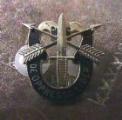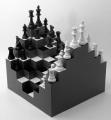Last edited by Bob's World; 03-14-2011 at 01:38 PM.
Robert C. Jones
Intellectus Supra Scientia
(Understanding is more important than Knowledge)
"The modern COIN mindset is when one arrogantly goes to some foreign land and attempts to make those who live there a lesser version of one's self. The FID mindset is when one humbly goes to some foreign land and seeks first to understand, and then to help in some small way for those who live there to be the best version of their own self." Colonel Robert C. Jones, US Army Special Forces (Retired)



















Bookmarks